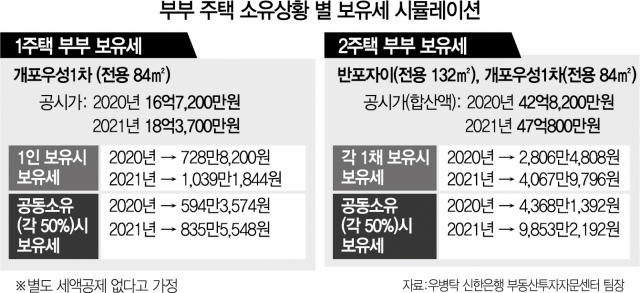■Gangnam two houses simulation
In case of joint name, both couples are two houses
I have to pay 9853 million won in ownership tax,
4,076 million won for each holding
Controversy over reverse discrimination
Glass when transferring, be cautious about change
 viewer
viewer
#. A couple who owns two apartments in Gangnam, Seoul. Taxes are also saved, and in line with the current trend, the couple shared half (50%) shares of both houses under a joint name. In the past few years, as house prices have risen significantly and the government’s publicly announced prices have jumped significantly, the sum of the publicly announced prices of the two units this year has risen to 4.78 billion won (4.28 billion won last year).
The government recommends the joint name of the couple, but in this case, unfortunately, Mr. A and Mrs. A are expected to face more than twice as much’tax bombs’ compared to when they each owned one. Seoul Economic Daily commissioned by Woo Byeong-tak, manager of the Real Estate Investment Advisory Center of Shinhan Bank, to estimate the ownership tax in this case (if there is no separate tax credit). However, if both houses are jointly owned, it is expected to pay 9853 million won. In terms of ownership tax alone, a common name is advantageous for one-homed owners, but in the case of multi-homed owners, each owner pays less tax.
As the official price of apartment houses began to be viewed this year, a controversy over equity is arising as multi-homed couples have a large difference in the ownership tax burden depending on the type of ownership. It is pointed out that there is a problem that the couple actually owns a house jointly, but there is a problem that the tax gap occurs by two to three times depending on whether they each own it or divide it under a common name.
Despite the same common name, the tax burden for one-house and two-households increases significantly because the government will provide tax deductions for the final tax to couples with a common name for one house from this year. The final tax is levied when the publicly announced price exceeds 900 million won for one house and 600 million won for two or more houses. The problem is that the tax imposition is based on the individual’s own house, so even if only a part of the stake is held, it is considered as one house. When a couple has 1 house each, it is 1 house and 2 houses, but in terms of each couple, it is 1 house. However, if both houses are under the common name, both couples become two houses.
It also affected the widening gap in tax rates depending on the number of homes held from this year. In the area subject to adjustment, the tax rate is 0.6~3% for one homeowner, but doubles to 1.2~6% for two homeowners. In addition, due to the amendment of the Endowment Tax Act, from this year, couples with a common name in one house can receive additional tax deductions for the elderly and long-term holdings.
In 2008, the government eased the limit of the gift tax deduction between couples from 300 million won to 600 million won. As a result, joint ownership in the market aimed at tax incentives increased. An official in the industry said, “In a situation where women’s participation in economic activities is increasing, the joint name should be encouraged, but it was a side effect of the government’s’beating multi-homed people’.”
Experts advise that it is necessary to be cautious about changing the form of holding only because of the burden of holding tax. “The ownership tax is a matter of tens to tens of millions of won, but the transfer tax is a matter of tens of thousands to tens of millions of won,” said Woo. “If the transfer tax is included, the joint name can still be advantageous. It is advisable to judge whether you have plans to sell the house and how much profit will be made.”
/ Reporter Jin Dong-young [email protected]
< 저작권자 ⓒ 서울경제, 무단 전재 및 재배포 금지 >
